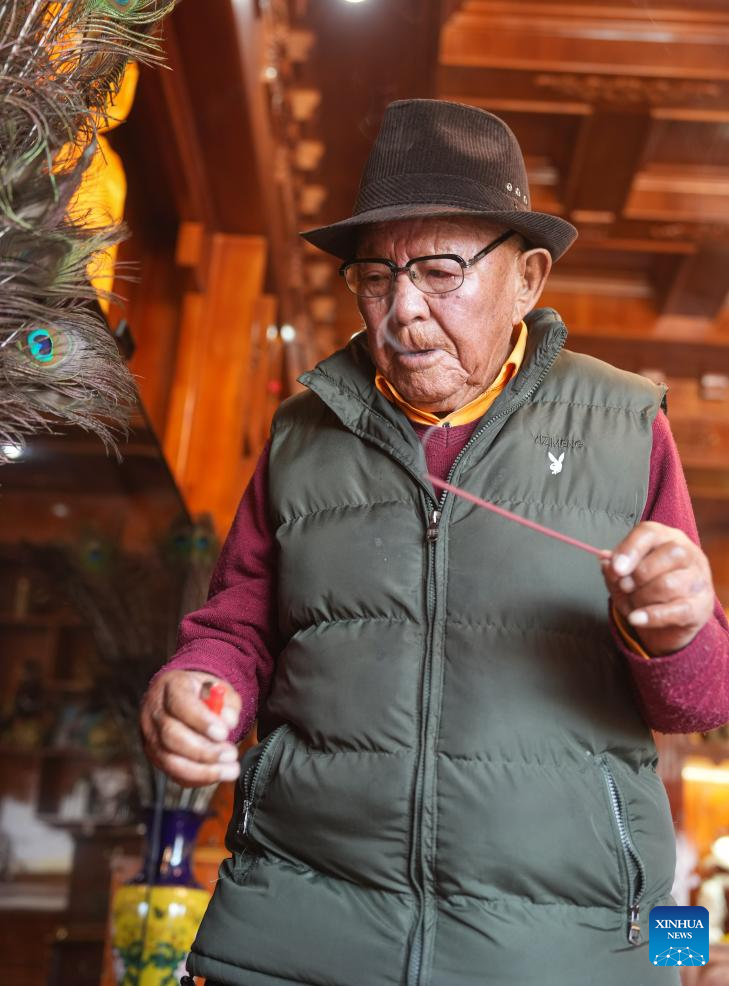
Losang burns incense at home in Doilungdeqen District of Lhasa, southwest China's Xizang Autonomous Region, March 20, 2025.
"In old Xizang, we were treated like livestock, ignored even in death," The 91-year-old former serf Losang, now living in Doilungdeqen District of Lhasa, still finds it hard to contain his emotions as he recalls the suffering endured before the democratic reform in Xizang.
From the age of 13, Losang was forced to work for serf owners. "We had to borrow food from serf owners in summer and repay debts in autumn. Failure to repay would result in beatings," he recalled, adding that serfs had no human rights, insufficient food and clothing, and even lived in livestock sheds. "In old Xizang, death laid in wait for us at every turn," Losang said.
Losang, along with some one million serfs, gained freedom after Xizang's democratic reform in 1959, which shattered the centuries-old feudal theocratic serfdom. "No longer do we have to bow to the serf owners, and we can choose our own life," exclaimed Losang.
Now, Losang peacefully enjoys retirement and lives a prosperous life with his family.
Today, Xizang has seen a rapid rise in the per-capita disposable income of residents, and the rights of people in Xizang to an adequate standard of living, education, work, health, and social security are better guaranteed. (Xinhua/Jigme Dorje)
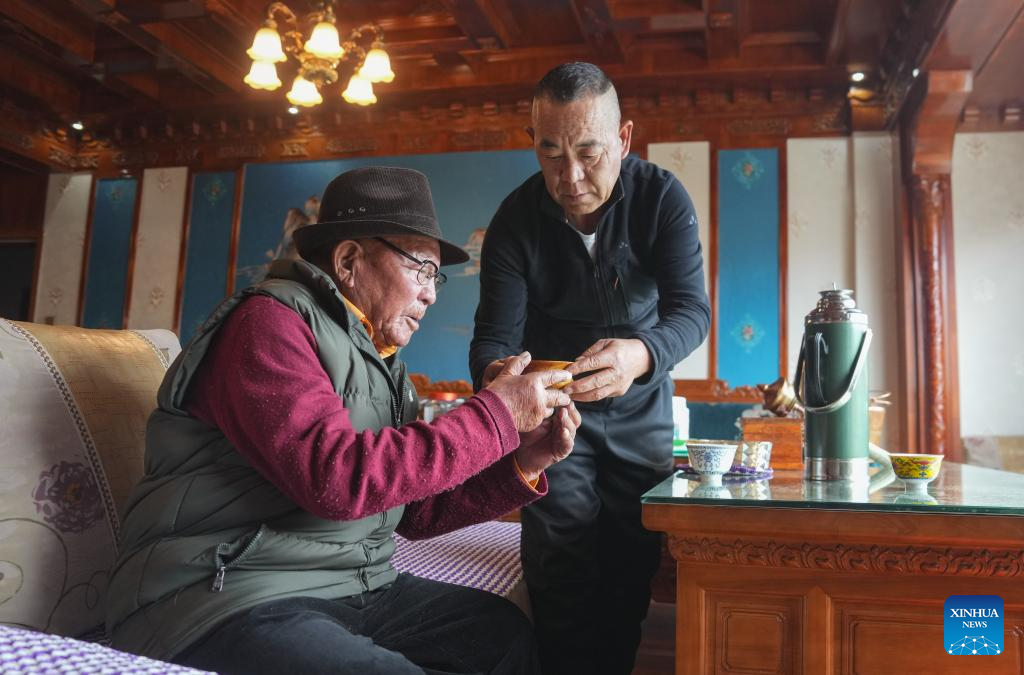
Losang's son serves tea to him at home in Doilungdeqen District of Lhasa, southwest China's Xizang Autonomous Region, March 20, 2025.
"In old Xizang, we were treated like livestock, ignored even in death," The 91-year-old former serf Losang, now living in Doilungdeqen District of Lhasa, still finds it hard to contain his emotions as he recalls the suffering endured before the democratic reform in Xizang.
From the age of 13, Losang was forced to work for serf owners. "We had to borrow food from serf owners in summer and repay debts in autumn. Failure to repay would result in beatings," he recalled, adding that serfs had no human rights, insufficient food and clothing, and even lived in livestock sheds. "In old Xizang, death laid in wait for us at every turn," Losang said.
Losang, along with some one million serfs, gained freedom after Xizang's democratic reform in 1959, which shattered the centuries-old feudal theocratic serfdom. "No longer do we have to bow to the serf owners, and we can choose our own life," exclaimed Losang.
Now, Losang peacefully enjoys retirement and lives a prosperous life with his family.
Today, Xizang has seen a rapid rise in the per-capita disposable income of residents, and the rights of people in Xizang to an adequate standard of living, education, work, health, and social security are better guaranteed. (Xinhua/Jigme Dorje)
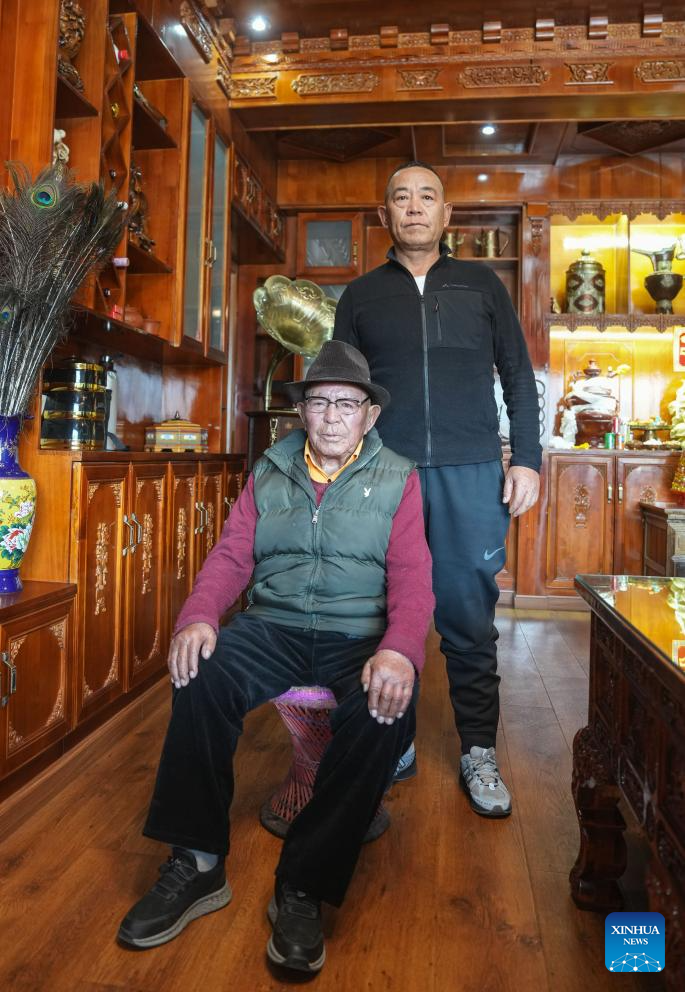
Losang (front) poses for a photo with his son at home in Doilungdeqen District of Lhasa, southwest China's Xizang Autonomous Region, March 20, 2025.
"In old Xizang, we were treated like livestock, ignored even in death," The 91-year-old former serf Losang, now living in Doilungdeqen District of Lhasa, still finds it hard to contain his emotions as he recalls the suffering endured before the democratic reform in Xizang.
From the age of 13, Losang was forced to work for serf owners. "We had to borrow food from serf owners in summer and repay debts in autumn. Failure to repay would result in beatings," he recalled, adding that serfs had no human rights, insufficient food and clothing, and even lived in livestock sheds. "In old Xizang, death laid in wait for us at every turn," Losang said.
Losang, along with some one million serfs, gained freedom after Xizang's democratic reform in 1959, which shattered the centuries-old feudal theocratic serfdom. "No longer do we have to bow to the serf owners, and we can choose our own life," exclaimed Losang.
Now, Losang peacefully enjoys retirement and lives a prosperous life with his family.
Today, Xizang has seen a rapid rise in the per-capita disposable income of residents, and the rights of people in Xizang to an adequate standard of living, education, work, health, and social security are better guaranteed. (Xinhua/Jigme Dorje)
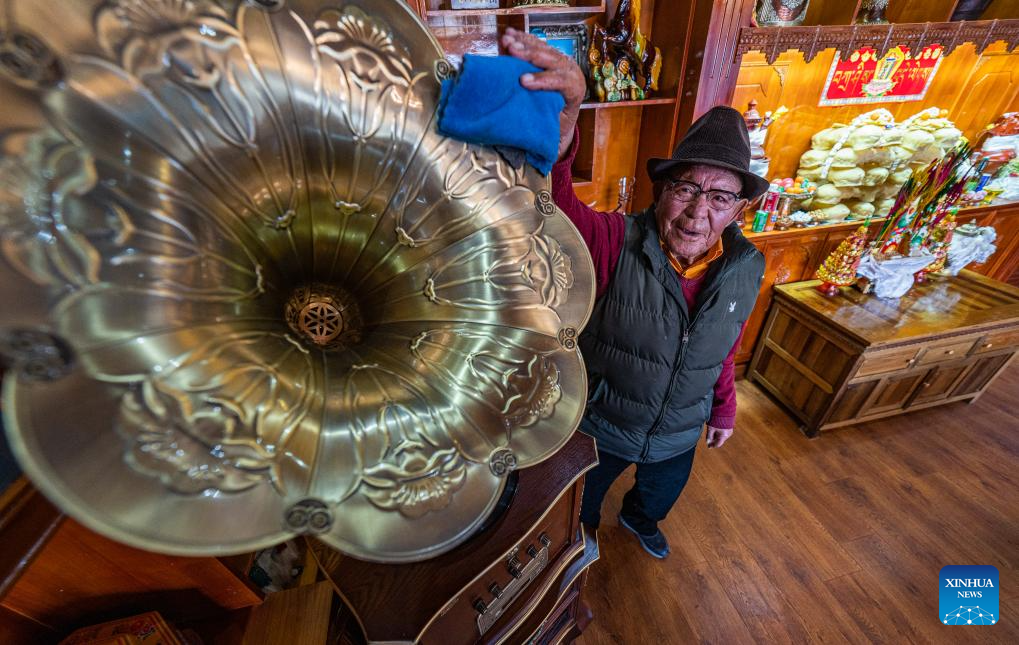
Losang wipes a record player at home in Doilungdeqen District of Lhasa, southwest China's Xizang Autonomous Region, March 20, 2025.
"In old Xizang, we were treated like livestock, ignored even in death," The 91-year-old former serf Losang, now living in Doilungdeqen District of Lhasa, still finds it hard to contain his emotions as he recalls the suffering endured before the democratic reform in Xizang.
From the age of 13, Losang was forced to work for serf owners. "We had to borrow food from serf owners in summer and repay debts in autumn. Failure to repay would result in beatings," he recalled, adding that serfs had no human rights, insufficient food and clothing, and even lived in livestock sheds. "In old Xizang, death laid in wait for us at every turn," Losang said.
Losang, along with some one million serfs, gained freedom after Xizang's democratic reform in 1959, which shattered the centuries-old feudal theocratic serfdom. "No longer do we have to bow to the serf owners, and we can choose our own life," exclaimed Losang.
Now, Losang peacefully enjoys retirement and lives a prosperous life with his family.
Today, Xizang has seen a rapid rise in the per-capita disposable income of residents, and the rights of people in Xizang to an adequate standard of living, education, work, health, and social security are better guaranteed. (Xinhua/Tenzin Nyida)
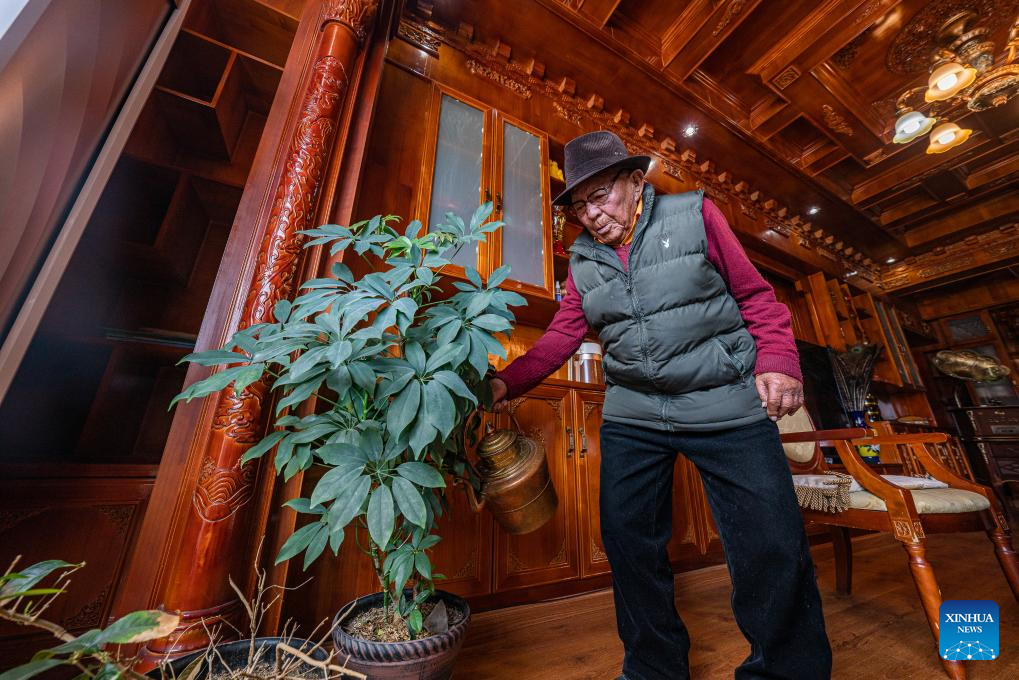
Losang waters a plant at home in Doilungdeqen District of Lhasa, southwest China's Xizang Autonomous Region, March 20, 2025.
"In old Xizang, we were treated like livestock, ignored even in death," The 91-year-old former serf Losang, now living in Doilungdeqen District of Lhasa, still finds it hard to contain his emotions as he recalls the suffering endured before the democratic reform in Xizang.
From the age of 13, Losang was forced to work for serf owners. "We had to borrow food from serf owners in summer and repay debts in autumn. Failure to repay would result in beatings," he recalled, adding that serfs had no human rights, insufficient food and clothing, and even lived in livestock sheds. "In old Xizang, death laid in wait for us at every turn," Losang said.
Losang, along with some one million serfs, gained freedom after Xizang's democratic reform in 1959, which shattered the centuries-old feudal theocratic serfdom. "No longer do we have to bow to the serf owners, and we can choose our own life," exclaimed Losang.
Now, Losang peacefully enjoys retirement and lives a prosperous life with his family.
Today, Xizang has seen a rapid rise in the per-capita disposable income of residents, and the rights of people in Xizang to an adequate standard of living, education, work, health, and social security are better guaranteed. (Xinhua/Tenzin Nyida)
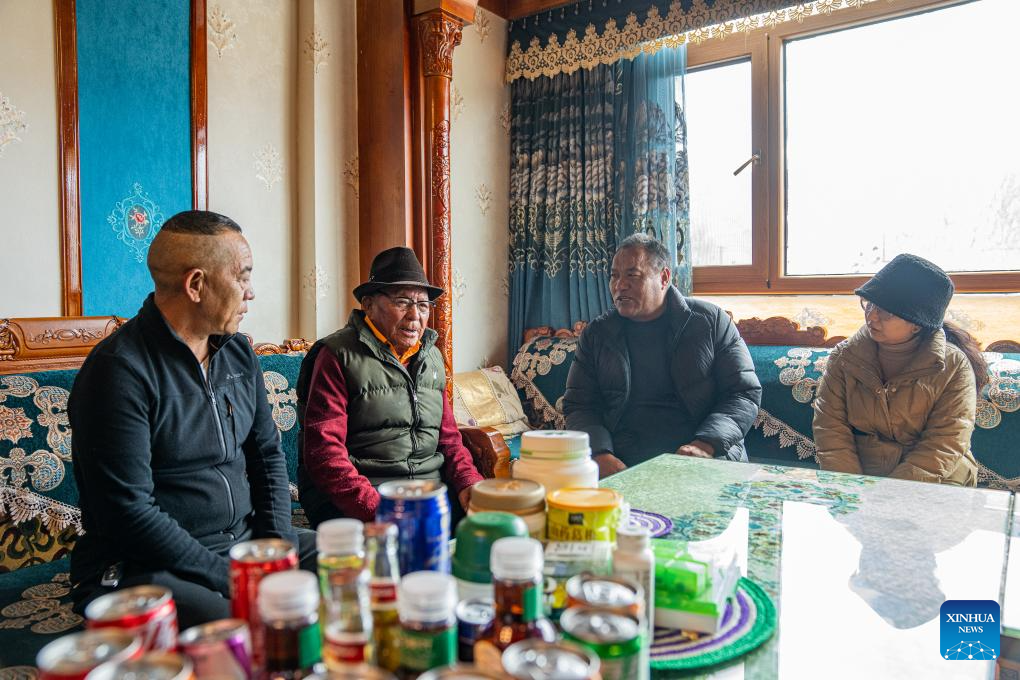
Losang (2nd L) talks with his son and neighbors at home in Doilungdeqen District of Lhasa, southwest China's Xizang Autonomous Region, March 20, 2025.
"In old Xizang, we were treated like livestock, ignored even in death," The 91-year-old former serf Losang, now living in Doilungdeqen District of Lhasa, still finds it hard to contain his emotions as he recalls the suffering endured before the democratic reform in Xizang.
From the age of 13, Losang was forced to work for serf owners. "We had to borrow food from serf owners in summer and repay debts in autumn. Failure to repay would result in beatings," he recalled, adding that serfs had no human rights, insufficient food and clothing, and even lived in livestock sheds. "In old Xizang, death laid in wait for us at every turn," Losang said.
Losang, along with some one million serfs, gained freedom after Xizang's democratic reform in 1959, which shattered the centuries-old feudal theocratic serfdom. "No longer do we have to bow to the serf owners, and we can choose our own life," exclaimed Losang.
Now, Losang peacefully enjoys retirement and lives a prosperous life with his family.
Today, Xizang has seen a rapid rise in the per-capita disposable income of residents, and the rights of people in Xizang to an adequate standard of living, education, work, health, and social security are better guaranteed. (Xinhua/Tenzin Nyida)
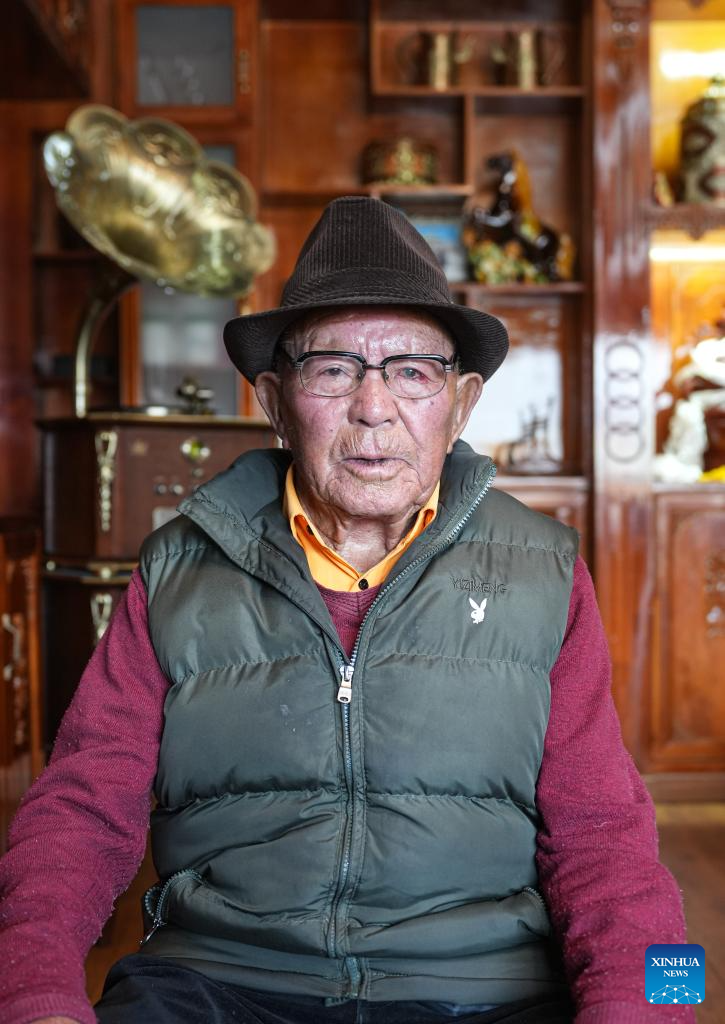
Losang is pictured in Doilungdeqen District of Lhasa, southwest China's Xizang Autonomous Region, March 20, 2025.
"In old Xizang, we were treated like livestock, ignored even in death," The 91-year-old former serf Losang, now living in Doilungdeqen District of Lhasa, still finds it hard to contain his emotions as he recalls the suffering endured before the democratic reform in Xizang.
From the age of 13, Losang was forced to work for serf owners. "We had to borrow food from serf owners in summer and repay debts in autumn. Failure to repay would result in beatings," he recalled, adding that serfs had no human rights, insufficient food and clothing, and even lived in livestock sheds. "In old Xizang, death laid in wait for us at every turn," Losang said.
Losang, along with some one million serfs, gained freedom after Xizang's democratic reform in 1959, which shattered the centuries-old feudal theocratic serfdom. "No longer do we have to bow to the serf owners, and we can choose our own life," exclaimed Losang.
Now, Losang peacefully enjoys retirement and lives a prosperous life with his family.
Today, Xizang has seen a rapid rise in the per-capita disposable income of residents, and the rights of people in Xizang to an adequate standard of living, education, work, health, and social security are better guaranteed. (Xinhua/Jigme Dorje)







